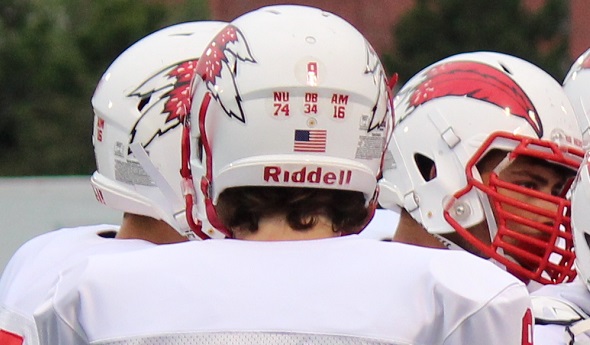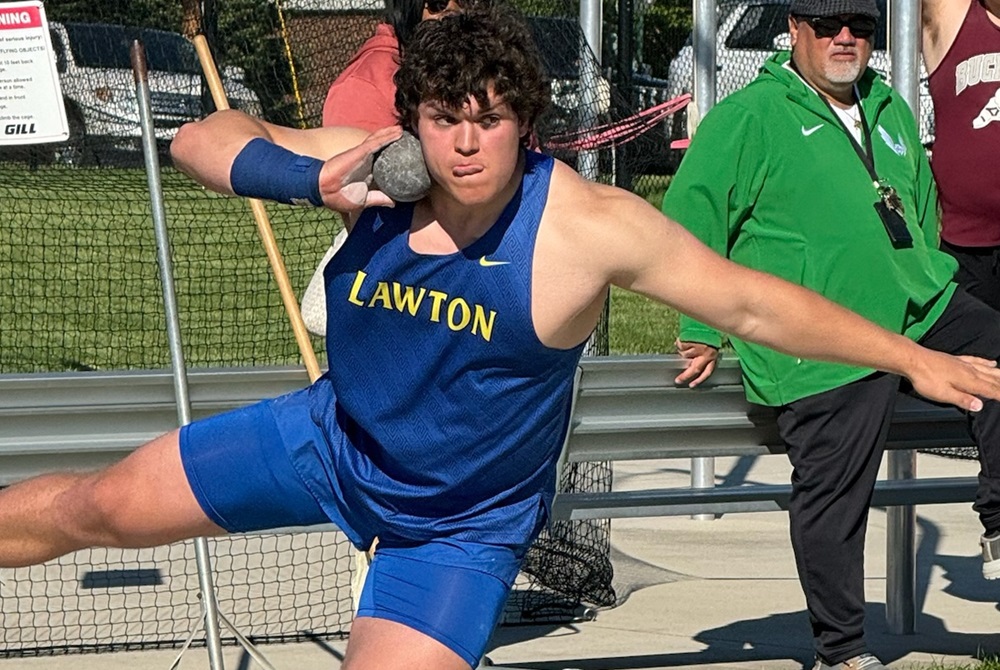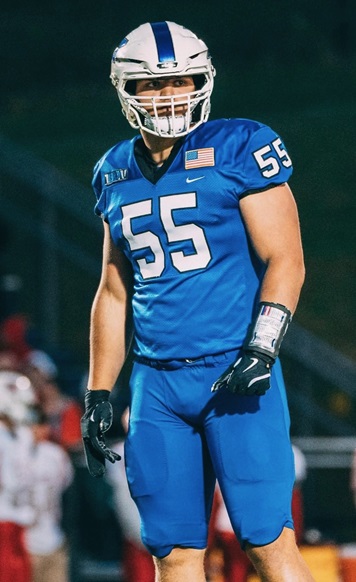
Football Teams Mourn, Regroup, Remember
By
Tom Markowski
Special for Second Half
September 2, 2015
CLINTON TOWNSHIP – A rash of deaths of high school football players in Macomb County and elsewhere in the Detroit area has shaken those communities and the football programs within them.
Three football players at Clinton Township Chippewa Valley have died in the past 16 months. This past May, two players from Sterling Heights Stevenson and one from Utica Ford died in a horrific automobile crash at Stoney Creek Metro Park. Another football player at Southfield High drowned in a swimming pool shortly before the start of practice last month.
 One player at Chippewa Valley died of cancer, another died from injuries suffered as the result of an accident that took place in a home and the third died Aug. 5, five days before the first official day of practice, in an all-terrain vehicle crash that took place in the northeast region of the Lower Peninsula.
One player at Chippewa Valley died of cancer, another died from injuries suffered as the result of an accident that took place in a home and the third died Aug. 5, five days before the first official day of practice, in an all-terrain vehicle crash that took place in the northeast region of the Lower Peninsula.
Chippewa Valley coach Scott Merchant played for coach Al Fracassa at Birmingham Brother Rice and then went on to play at Albion College before becoming a coach. Merchant remains shaken by the tragic events that have befallen his program.
In addition to the deaths of his players, two parents of former players, one only 46 years old, died during this time frame.
“They don’t give out manuals for this,” Merchant said. “It’s taken a lot out of me, personally. I don’t know. I’ve spent so much time away from my family, going to hospitals, going to funeral homes. You’re talking about young people’s lives here.
”I don’t know. I go to church. I believe in God. He has a plan. It’s hard to look a 16- or 17-year-old in their eyes and make sense of it all.”
Coaches coach, but there is so much more they are asked to do. They are expected to be mentors. They are often expected to be father figures. Sometimes they act as counselors, even if it isn’t in their job description. Perhaps most importantly they are leaders. They instruct their coaches and give them responsibilities. Players follow their directives and look to them for guidance.
On top of this, coaches are expected to be successful on the field. And a vast majority accept these responsibilities and a modest financial reward with a smile.
But when one of their players dies while still in high school, coaches must also remain emotionally strong for those who are too young to comprehend the finality.
Words of encouragement and a strong embrace can go a long way in times of trouble.
“We tell them, we’re here for you,” Merchant said. “We love you. We’re all hurting. We tell them there are two options. You can quit and be miserable. Or you can get off the ground and keep their memory alive.”
Nick Ureel was a senior at Chippewa Valley when he died of cancer in April 2014. Ureel played football his first two years but the cancer, which began in his testicles, prevented him from playing his junior and senior years.
Alex Mackmin was 16 years old when he died this May. He played on the junior varsity as a sophomore last season.
Merchant held workouts on Aug. 3 and 4 before letting his players go and enjoy the final few days before the start of practice Aug. 10. Duncan Blair, a senior who would compete for a starting position at linebacker, travelled north on vacation. He died while riding a four-wheel off-road vehicle that struck a tree.
 Coincidentally the Mackmin and Blair families attended the same church in Utica. Both funerals were held at that church.
Coincidentally the Mackmin and Blair families attended the same church in Utica. Both funerals were held at that church.
Blair’s parents rode the fan bus to Wayne State University for Chippewa Valley’s opener against Lake Orion. Rhys Blair runs the concession stand at Chippewa Valley.
The circumstances were much different for the players who died in the crash in early May in northern Macomb County – but it was no less tragic.
Jonathan Manolios and Emanuel Malaj from Stevenson and Michael Wells from Utica Ford were killed in a car crash. All three played varsity football as juniors in 2014. Two other high school students were injured in the crash and both survived. All five were 17 years old at the time of the crash.
Last season was Kevin Frederick’s first as head coach at Stevenson. He was the former head coach at Whittemore-Prescott.
Frederick had never dealt with anything like this before.
“It was devastating,” he said. “We had a meeting with the kids at school and discussed why it happened. There were grief counselors available. I did meet with some of the parents. Some reached out and said their son wasn’t handling it well.
“We warned our kids not to go on social media after. People forget (the students) were very young. There were some very unkind things said on social media. Alcohol was involved. Their mistake cost them their lives. We tell them to think before you get into a car. Think before you take a drink.
“Scott’s circumstances were different. Kids act in a way … it costs them dearly. Some walk away and grow. This time they didn’t walk away.”
Chippewa Valley and Stevenson are members of the Macomb Area Conference Red, and the teams will play Sept. 11 at Stevenson. Both coaches say they will do something to remember those who died.
Chippewa Valley opens its home season a week later against Warren Cousino. Merchant said his players will wear black jerseys instead of their traditional red to remember those who died.
“Football isn’t an escape,” Merchant said. “It’s a distraction. It takes your mind off of it, but it really doesn’t. We have pictures of all three (students) in our locker room. They are there to remind us.”
 Tom Markowski is a columnist and directs website coverage for the State Champs! Sports Network. He previously covered primarily high school sports for the The Detroit News from 1984-2014, focusing on the Detroit area but also contributing to statewide coverage of football and basketball. Contact him at tmarkowski@statechampsnetwork.com with story ideas for Oakland, Macomb and Wayne counties.
Tom Markowski is a columnist and directs website coverage for the State Champs! Sports Network. He previously covered primarily high school sports for the The Detroit News from 1984-2014, focusing on the Detroit area but also contributing to statewide coverage of football and basketball. Contact him at tmarkowski@statechampsnetwork.com with story ideas for Oakland, Macomb and Wayne counties.
PHOTOS: (Top) Chippewa Valley players are wearing the numbers of three deceased teammates on the backs of their helmets this season. (Middle) Coach Scott Merchant addresses his players after last week's win against Lake Orion at Wayne State University.

Football Future Awaits, but Mayne Focused First on Finishing Track Finals Sweep
By
Pam Shebest
Special for MHSAA.com
April 22, 2025
LAWTON — One inch. One lousy inch.
 That was the difference between a championship and second place for Mason Mayne in the shot put at last year’s MHSAA Lower Peninsula Division 3 Track & Field Finals.
That was the difference between a championship and second place for Mason Mayne in the shot put at last year’s MHSAA Lower Peninsula Division 3 Track & Field Finals.
One year later, it is still fresh in the mind of the personable Lawton senior as he begins his quest for more hardware.
“That one hurt,” said Mayne, whose best attempt finished second to a 60-foot, 2-inch toss by Pewamo-Westphalia’s Gavin Nurenberg.
“That really burned. You start to wonder, did they measure it wrong? What if I just literally put a little more into it? It drove me to work harder toward it.”
That harder work paid off during the second event that day as Mayne defeated the then-senior Nurenberg 166-6 to 165-11 in the discus to claim Lawton’s first-ever track & field state championship in that event.
Besides taking home that Finals title last year, Mayne holds school records with an indoor-season shot of 62-6 and outdoor of 60-9, as well as a discus toss of 178 feet.
An all-state football player and outstanding student as well, Mayne had opportunities to continue his athletic careers in both sports before signing with Northwestern University. But he also made the decision to compete for his high school one more time this spring instead of graduating early to begin his college career – much to the delight of Lawton track & field coach Mike Meyer.
“He’s been nothing but a joy ever since his freshman year,” Meyer said. “He’s a good, hard worker, obviously a great athlete. All his talent is definitely a nice problem to have.
“He’s been a two-year captain for us, so a good leader, (he) does everything and more than what we ask. That’s why he has the success that he has.”
All-around talent
Mayne said coaching is one big crossover from football to track & field.
“Listening to someone tell you what to do and then do it, I think that’s a super big part of throwing,” he said. “If someone tells you how to do something better in your throw to make it technically better, and you can’t do it, then you can’t get better.
“Playing football for so long, I’ve had so many coaches tell me to do this just a little bit different. And being able to flip that and make that change and adjustment, that’s what makes me able to get better at throwing.”
Mayne said hurling the disc takes more finesse than the shot.
“Technical-wise, the shot put (12 pounds) is easier because I can base it more on how much muscle I can put into it,” he said. “Discus is lighter, (3.5 pounds) but you also have to use your technique a lot more.
“Also, you have to push your body to a point of really stretching it back, allowing it to create a lot of torque into the disc to be able to throw it far enough for it to be worth anything.”
As for those windy days competing in field events, “A lot of people think that the wind behind you helps you,” Mayne said. “That’s actually not true.
“It actually bats the disc down. In the discus, as a right-handed thrower, you want the wind to come across a little bit from your left to throw into. Think of it as an airplane wing, holding up the airplane, the air coming into it. With the shot, it doesn’t matter. It’s just throwing it.”
Lawton’s athletes who specialize in field events also compete in some running competition. Mayne has run the 200 this season and took a turn running the 100 last spring as well.
 “We usually have our throwers run the 200,” Meyer said. “We like athletes instead of just specializing in just one or two things for the (Southwest Athletic) Conference.
“We usually have our throwers run the 200,” Meyer said. “We like athletes instead of just specializing in just one or two things for the (Southwest Athletic) Conference.
“We have all of our kids run two, three and sometimes four events. It can be a long day at a track meet if your events are done and you have nothing to do.”
Mayne is not only an accomplished athlete, but carries a 4.19 grade-point average.
“With the way my mom (Pat) raised me and my brother (Carter) both, she’s a teacher at Paw Paw in the elementary,” he said. “She raised us with the idea that academics are very important. That’s where I’m academically driven.
“She might get mad at me for saying this, but if I miss an assignment, I’m getting a picture on my phone with a circle around it of the assignment missing in my grade book. It’s very important to me.”
That emphasis motivates Mayne’s advice for freshmen who play sports.
“Stay on top of (academics),” he said. “For so many years my mom kept me on top of things. Now I’m able to stay on top of things better myself.
“Your freshman year is the make-or-break it. Having an older brother helped a lot because without him, he wouldn’t have told me that and I wouldn’t have stayed ahead of it.”
Tough decisions
Mayne’s outstanding performances in throwing events last year attracted several college scholarship offers for track in addition to several he’d received previously for football. Choosing a college was not an easy decision for the defensive lineman, who is a two-time Kalamazoo Gazette Dream Team selection in that sport.
“It’s funny because I was really, really considering track for a while,” said the 6-foot-3, 275-pound Mayne. “After my sophomore year when I had a very successful track season, I started to lean toward track.”
 But a trip to the Big House to watch University of Michigan play tilted the scale to football.
But a trip to the Big House to watch University of Michigan play tilted the scale to football.
“I was watching and I realized I just couldn’t give it up,” he said. “I love both sports, but something about football, the team atmosphere, just sitting in the stadium gets me antsy, that atmosphere and that vibe. That’s really what flipped me into the football aspect. That electricity from the fans and the guys around you. I haven’t experienced any other sport like it.
“It was a very tough decision. I was sad that I couldn’t go multiple ways. Many fantastic coaches recruited me. It’s unfortunate that you have to tell coaches you can’t go to their program because you’re choosing a different program.”
Mayne said he had specific criteria in mind when choosing a college. “Academics is a priority here,” he said. “I also want to play football at a very high level, and then the last is a family aspect.
“Northwestern just checked all the boxes.”
Before the season, Meyer thought he might lose Mayne to early graduation since “he’s a very, very good student. We chatted and he said, ‘Coach, I definitely want to be throwing. I love throwing,’ and he’s a man of his word.
“Once he told me that, I was more excited for the season.”
At one point, Mayne did indeed consider leaving high school to enroll early at Northwestern, which would have meant missing his final spring throwing season.
However, “my mom wasn’t ready for me to leave, which I’m fine with,” he said. “I understand that. I’m her youngest child, I get it.
“Also, you get to start throwing indoors and it’s like, ‘I don’t want to give this up, either.’”
 Pam Shebest served as a sportswriter at the Kalamazoo Gazette from 1985-2009 after 11 years part-time with the Gazette while teaching French and English at White Pigeon High School. She can be reached at pamkzoo@aol.com with story ideas for Calhoun, Kalamazoo and Van Buren counties.
Pam Shebest served as a sportswriter at the Kalamazoo Gazette from 1985-2009 after 11 years part-time with the Gazette while teaching French and English at White Pigeon High School. She can be reached at pamkzoo@aol.com with story ideas for Calhoun, Kalamazoo and Van Buren counties.
PHOTOS (Top) Lawton’s Mason Mayne begins to unwind while throwing the shot during a meet. (Middle) Lawton track & field coach Mike Meyer. (Below) Mayne stands tall on the football field. (Action photos courtesy of Mason Mayne; headshot by Pam Shebest.)

